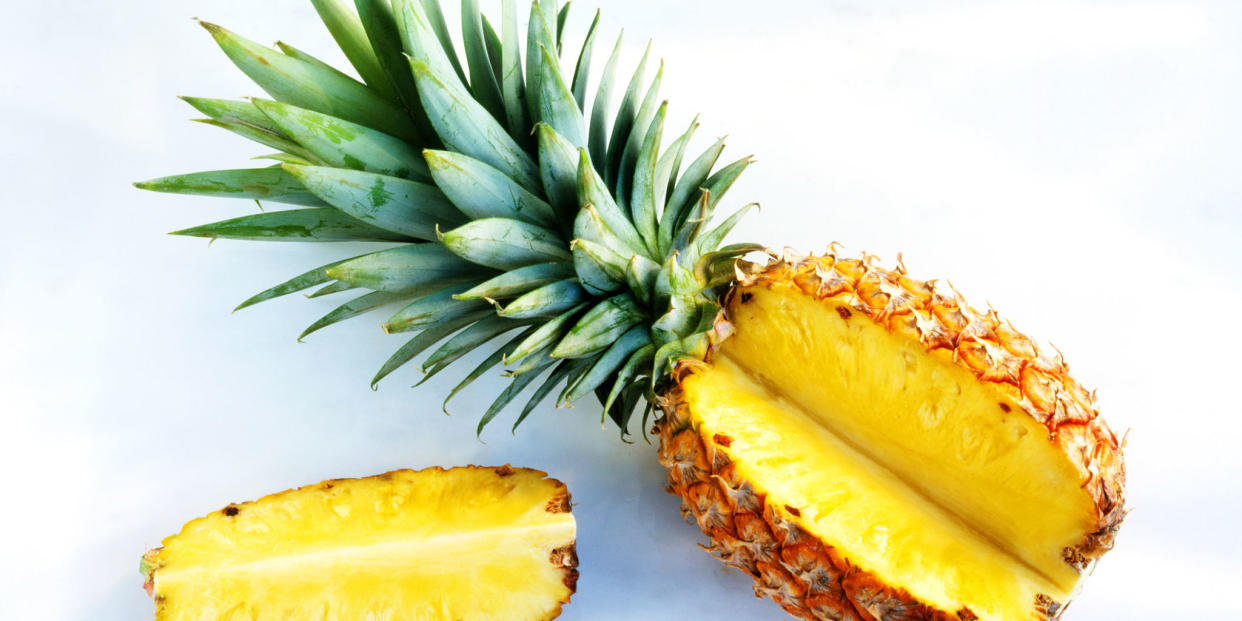[UPDATED] What You Really Need To Know About Those Viral Pink Pineapples

UPDATE: May 25, 2017 at 11:03 a.m.
At the tail end of last year we were introduced to the pink pineapple, a beautiful yet totally odd creation. While they've been in development for over 12 years, only now are companies like Del Monte and Dole able to start selling the genetically modified, albeit insanely pretty, fruit in stores.
Before you get creeped out by the GMO label, keep in mind that the FDA has already given them its stamp of approval, explaining: The pineapples were simply "engineered to produce lower levels of the enzymes already in conventional pineapple that convert the pink pigment lycopene to the yellow pigment beta carotene. Lycopene is the pigment that makes tomatoes red and watermelons pink, so it is commonly and safely consumed."
But they'll look more like the below photo featuring pale pink flesh, and not the doctored images that show off bright pink outer skins.
ORIGINAL POST: December 16, 2016 at 6:05 p.m.
When we first heard about cotton candy grapes, we thought the internet was pranking our candy-loving hearts. How could such a magical fruit exist? To our shock they are very real-and we immediately set out to get our hands on a bushel. Now we're intrigued by yet another strange fruit: the pink pineapple.
While it's much lesser known than, say, purple potatoes and the aforementioned candy grapes, pink pineapples are definitely real. So much so that they even have their own patent under the fruit-producing giant Del Monte. (Because they've been genetically modified.)
In development since 2005, the fruit was only just given the Food and Drug Administration's seal of approval this week, NBC News reports. So far, Del Monte is the only company to produce pink pineapples, growing them in Costa Rica.
Fittingly, they're known as the Rosé (cute, huh?) and are made rose-colored by adding lycopene, the substance that gives tomatoes their ruby hue. What's more, Del Monte claims the fruit is made sweeter from this addition, proposing a new label that reads "extra sweet pink flesh pineapple."
Oddly the brand has been keeping this phenomenon mostly under wraps, so the images circulating online have been doctored using Photoshop or other picture-editing tools.
#GMO Pink Pineapple Is Safe to Sell, #FDA Sayshttps://t.co/yJ2o9J32iw pic.twitter.com/tnLaAL4rXK
- C. S. Prakash (@AgBioWorld) December 15, 2016
Pink pineapple soon your table, thanks GMO! pic.twitter.com/wFMWWHqtDO
- C. S. Prakash (@AgBioWorld) December 15, 2016
So we're still unsure exactly what they look like but these do a decent job of illustrating the potential product:

We're pretty sure these are going to be all the rage next summer, especially as a garnish to frozen rosé cocktails and pink piña coladas.
Follow Delish on Instagram.
You Might Also Like

